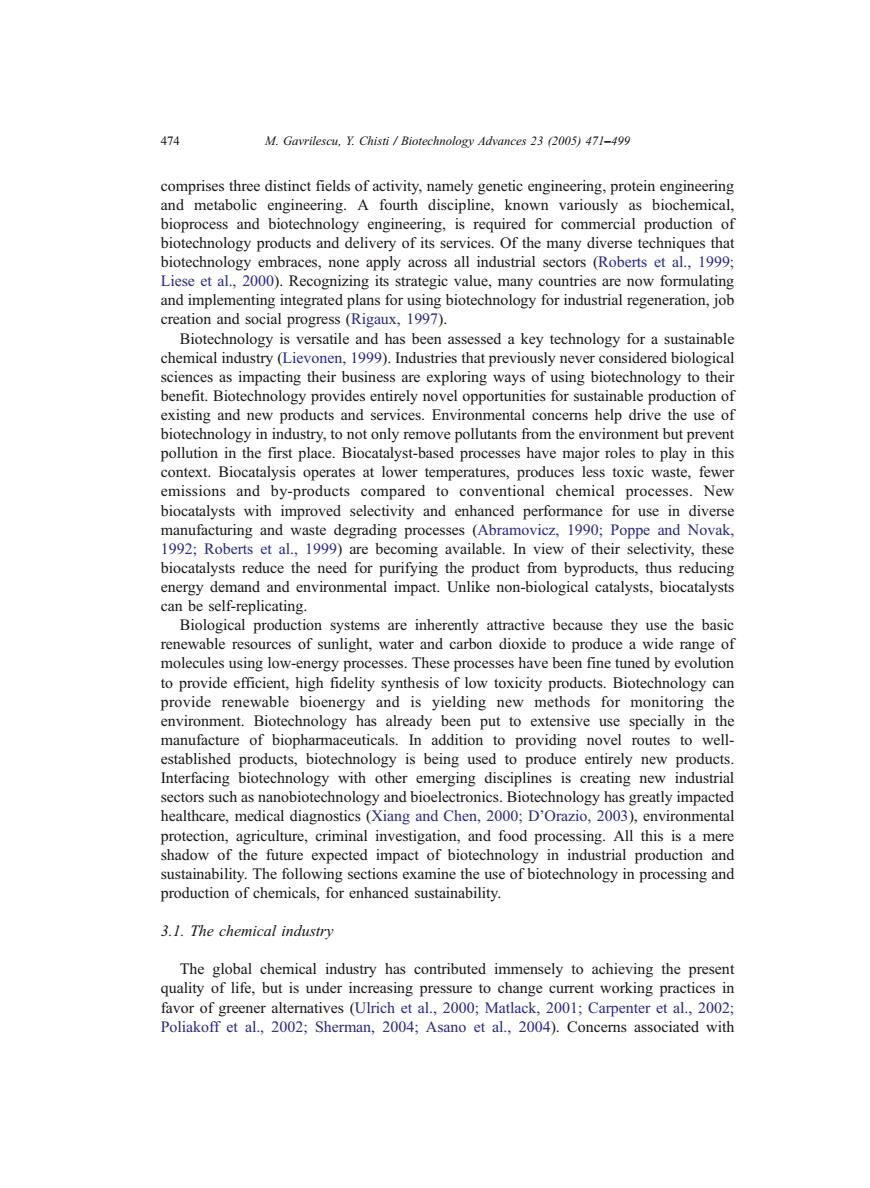正在加载图片...

474 M.Gavrilescu,Y.Chisti Biotechnology Advances 23 (2005)471-499 comprises three distinct fields of activity,namely genetic engineering,protein engineering and metabolic engineering.A fourth discipline,known variously as biochemical, bioprocess and biotechnology engineering,is required for commercial production of biotechnology products and delivery of its services.Of the many diverse techniques that biotechnology embraces,none apply across all industrial sectors (Roberts et al.,1999; Liese et al.,2000).Recognizing its strategic value,many countries are now formulating and implementing integrated plans for using biotechnology for industrial regeneration,job creation and social progress(Rigaux,1997). Biotechnology is versatile and has been assessed a key technology for a sustainable chemical industry (Lievonen,1999).Industries that previously never considered biological sciences as impacting their business are exploring ways of using biotechnology to their benefit.Biotechnology provides entirely novel opportunities for sustainable production of existing and new products and services.Environmental concerns help drive the use of biotechnology in industry,to not only remove pollutants from the environment but prevent pollution in the first place.Biocatalyst-based processes have major roles to play in this context.Biocatalysis operates at lower temperatures,produces less toxic waste,fewer emissions and by-products compared to conventional chemical processes.New biocatalysts with improved selectivity and enhanced performance for use in diverse manufacturing and waste degrading processes (Abramovicz,1990;Poppe and Novak, 1992;Roberts et al.,1999)are becoming available.In view of their selectivity,these biocatalysts reduce the need for purifying the product from byproducts,thus reducing energy demand and environmental impact.Unlike non-biological catalysts,biocatalysts can be self-replicating. Biological production systems are inherently attractive because they use the basic renewable resources of sunlight,water and carbon dioxide to produce a wide range of molecules using low-energy processes.These processes have been fine tuned by evolution to provide efficient,high fidelity synthesis of low toxicity products.Biotechnology can provide renewable bioenergy and is yielding new methods for monitoring the environment.Biotechnology has already been put to extensive use specially in the manufacture of biopharmaceuticals.In addition to providing novel routes to well- established products,biotechnology is being used to produce entirely new products. Interfacing biotechnology with other emerging disciplines is creating new industrial sectors such as nanobiotechnology and bioelectronics.Biotechnology has greatly impacted healthcare,medical diagnostics (Xiang and Chen,2000;D'Orazio,2003),environmental protection,agriculture,criminal investigation,and food processing.All this is a mere shadow of the future expected impact of biotechnology in industrial production and sustainability.The following sections examine the use of biotechnology in processing and production of chemicals,for enhanced sustainability. 3.1.The chemical industry The global chemical industry has contributed immensely to achieving the present quality of life,but is under increasing pressure to change current working practices in favor of greener alternatives (Ulrich et al.,2000;Matlack,2001;Carpenter et al.,2002; Poliakoff et al.,2002;Sherman,2004;Asano et al.,2004).Concerns associated withcomprises three distinct fields of activity, namely genetic engineering, protein engineering and metabolic engineering. A fourth discipline, known variously as biochemical, bioprocess and biotechnology engineering, is required for commercial production of biotechnology products and delivery of its services. Of the many diverse techniques that biotechnology embraces, none apply across all industrial sectors (Roberts et al., 1999; Liese et al., 2000). Recognizing its strategic value, many countries are now formulating and implementing integrated plans for using biotechnology for industrial regeneration, job creation and social progress (Rigaux, 1997). Biotechnology is versatile and has been assessed a key technology for a sustainable chemical industry (Lievonen, 1999). Industries that previously never considered biological sciences as impacting their business are exploring ways of using biotechnology to their benefit. Biotechnology provides entirely novel opportunities for sustainable production of existing and new products and services. Environmental concerns help drive the use of biotechnology in industry, to not only remove pollutants from the environment but prevent pollution in the first place. Biocatalyst-based processes have major roles to play in this context. Biocatalysis operates at lower temperatures, produces less toxic waste, fewer emissions and by-products compared to conventional chemical processes. New biocatalysts with improved selectivity and enhanced performance for use in diverse manufacturing and waste degrading processes (Abramovicz, 1990; Poppe and Novak, 1992; Roberts et al., 1999) are becoming available. In view of their selectivity, these biocatalysts reduce the need for purifying the product from byproducts, thus reducing energy demand and environmental impact. Unlike non-biological catalysts, biocatalysts can be self-replicating. Biological production systems are inherently attractive because they use the basic renewable resources of sunlight, water and carbon dioxide to produce a wide range of molecules using low-energy processes. These processes have been fine tuned by evolution to provide efficient, high fidelity synthesis of low toxicity products. Biotechnology can provide renewable bioenergy and is yielding new methods for monitoring the environment. Biotechnology has already been put to extensive use specially in the manufacture of biopharmaceuticals. In addition to providing novel routes to wellestablished products, biotechnology is being used to produce entirely new products. Interfacing biotechnology with other emerging disciplines is creating new industrial sectors such as nanobiotechnology and bioelectronics. Biotechnology has greatly impacted healthcare, medical diagnostics (Xiang and Chen, 2000; D’Orazio, 2003), environmental protection, agriculture, criminal investigation, and food processing. All this is a mere shadow of the future expected impact of biotechnology in industrial production and sustainability. The following sections examine the use of biotechnology in processing and production of chemicals, for enhanced sustainability. 3.1. The chemical industry The global chemical industry has contributed immensely to achieving the present quality of life, but is under increasing pressure to change current working practices in favor of greener alternatives (Ulrich et al., 2000; Matlack, 2001; Carpenter et al., 2002; Poliakoff et al., 2002; Sherman, 2004; Asano et al., 2004). Concerns associated with 474 M. Gavrilescu, Y. Chisti / Biotechnology Advances 23 (2005) 471–499